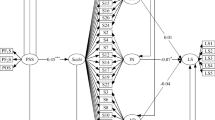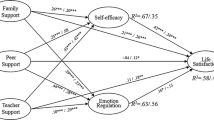Abstract
This investigation attempts to measure the relative influence of peer and parental influence on the perceived life satisfaction of two groups of secondary students in Hong Kong. Data on 1906 students from 30 schools were collected through the use of a self-administered questionnaire. Respondents were asked to rate their level of satisfaction on 26 different domains of life on a seven-point scale, ranging from “very satisfied” to “very dissatisfied”, as well as their satisfaction with life in general. These 26 items were combined to form six summary indices of life satisfaction: school life, family life, acceptance by others, government, media, and living environment. Two independent variables were used in the analysis of life satisfaction: peer orientation, and parent orientation. Both are composite indices and measure the adolescent's attachment to and identification with his peers or parents. It was found that parent orientation is a better predictor of life satisfaction than peer orientation. Adolescents who are high on parent orientation are more satisfied with every domain of life. They are also more satisfied with life in general. The relationship between peer orientation and life satisfaction is not a clear-cut one. Adolescents with strong peer orientation are more satisfied with school, media, government, and acceptance by others, but are less satisfied with family. There is no significant relationship between peer orientation and environment. The younger adolescents in our sample tend to perceive a higher level of satisfaction than the older adolescents in every domain of life as well as life in general.
Similar content being viewed by others
References
Andrews, F. M.: 1974, ‘Social indicators of perceived life quality’, Social Indicators Research 1, 279–99.
Andrews, F. M. and Withey, S. B.: 1974, ‘Developing measures of perceived life quality: results from several national surveys’, Social Indicators Research 1, 1–26.
Andrews, F. M. and Withey, S. B.: 1976, Social Indicators of Well-Being: American's Perceptions of Life Quality (Plenum, New York).
Appleyard, D. and Lintell, M.: 1972, ‘The environmental quality of city streets: the residents' viewpoint’, Journal of the American Institute of Planners 38, 84–101.
Campbell, A.: 1981, The Sense of Well-Being in America (McGraw-Hill, New York).
Campbell, A. and Converse, P. E.: 1972, The Human Meaning of Social Change (Russell Sage, New York).
Campbell, A., Converse, P. E. and Rodgers, W. L.: 1976, The Quality of American Life: Perceptions, Evaluation, and Satisfaction (Russell Sage, New York).
Carley, M.: 1981, Social Measurement and Social Indicators (George Allen & Unwin, London).
Carp, F. M., Zawadski, R. T. and Shokrkon, H.: 1976, ‘Dimensions of urban environmental quality’, Environment and Behavior 8, 239–64.
Ferriss, A. L.: 1975, ‘National approaches to developing social indicators’, Social Indicators Research 2, 81–92.
Kennedy, L. W., Northcott, R. C. and Kinzel, C.: 1978, ‘Subjective evaluation of well-being: problems and prospects’, Social Indicators Research 5, 457–74.
Knox, P. L.: 1975, Social Well-Being: A Spatial Perspective (Oxford, London).
Knox, P. L.: 1976, Social Priorities for Social Indicators, Occasional Paper No: 4, Department of Geography, University of Dundee.
Kozma, A. and Stones, M. J.: 1988, ‘Social desirability in measures of subjective well-being: age comparisons’, Social Indicators Research 20, 1–14.
Kuz, T. J.: 1978, ‘Quality of life: an objective and subjective variable analysis’, Regional Studies 12, 409–17.
Liu, B.: 1974, ‘Quality of life indicators: a preliminary investignation’, Social Indicators Research 1, 187–208.
Liu, B.: 1976, Quality of Life Indicators in U.S. Metropolitan Areas (Praeger, New York).
McCalll, S.: 1975, ‘Quality of life’, Social Indicators Research 2, 229–48.
Milbrath, L. W. and Sahr, R. C.: 1975, ‘Perceptions of environmental quality’, Social Indicators Research 1, 397–438.
Mitchell, R. E.: 1969, Pupil, Parent, and School: A Hong Kong Study, Orient Cultural Service (Taipei).
Organization for Economic Co-operation and Development: 1982, The OECD List of Social Indicators (Paris).
Rodgers, W. L. and Converse, P. E.: 1975, ‘Measures of the perceived overall of life’, Social Indicators Research 2, 127–52.
Schmandt, H. and Bloomberg, W. (eds.): 1969, The Quality of Urban Life (Sage, Beverley Hills).
Schneider, M.: 1975, ‘The quality of life in large American cities: objective and subjective and subjective social indicators’, Social Indicators Research 1, 495–509.
Strumpel, B. (ed.): 1974, Subjective Elements of Well-Being, Organization for Economic Co-operation and Development (Paris).
Szalai, A. and Andrews, F. M. (eds.): 1980, The Quality of Life: Comparative Studies (Sage, Beverley Hills).
UNESCO: 1974, Social Indicators: Problems of Definition and of Selection (Paris).
Author information
Authors and Affiliations
Rights and permissions
About this article
Cite this article
Man, P. The influence of peers and parents on youth life satisfaction in Hong Kong. Soc Indic Res 24, 347–365 (1991). https://doi.org/10.1007/BF00383734
Received:
Issue Date:
DOI: https://doi.org/10.1007/BF00383734




